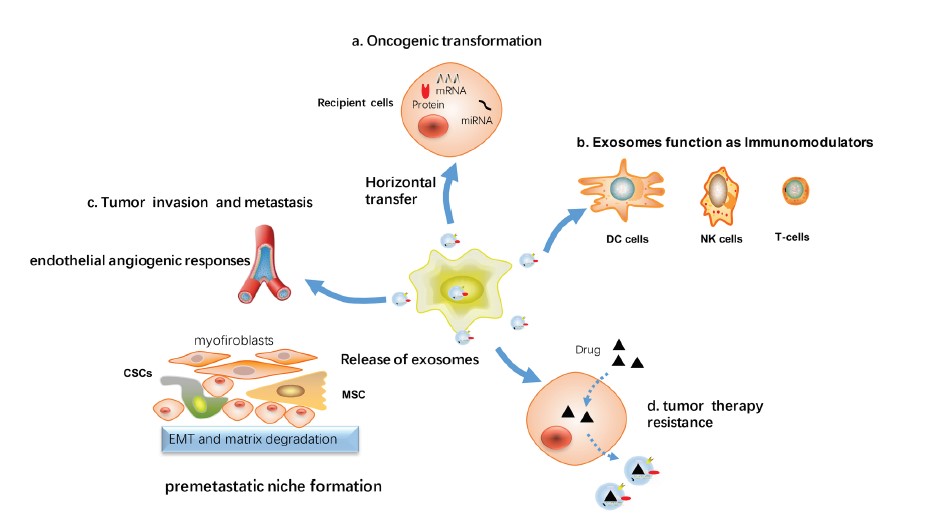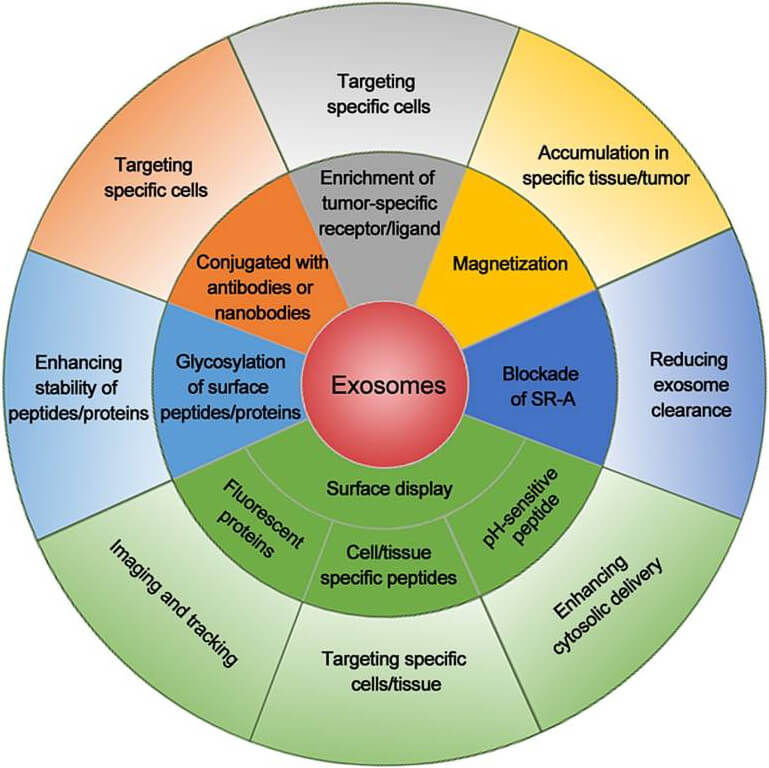Cancer Therapy
After years of hard working in exosomes research, Creative Biolabs has got well known about the necessary knowledge and technologies of exosome. We now successfully operate a platform that can provide a full range of exosome services to facilitate the development of cancer therapies.
Exosome in Cancer Progression
Cancer remains one of the leading causes of death due to the late diagnosis, poor prognosis, and frequent occurrence of drug resistance and metastasis. Exosomes transfer bioactive molecules between cancer and other cells, modulate the biological functions of recipient cells, thus participating in the progression and metastasis in multiple cancers.
Prostate Cancer
Exosomes regulate angiogenesis in prostate cancer, which may be brought by exosome-mediated delivery of growth factors or RNAs. They can also regulate the tumor microenvironment by activating stromal cells to a disease-supporting myofibroblast-like phenotype and may be capable of modulating myeloid cells, which will further change immune and inflammatory responses within the tumor microenvironment. Exosomes are capable of regulating cancer cell metabolism and tumor metastasis, as well as transferring drug resistance. Such exosome-mediated effects may impact tumor progression through direct or indirect mechanisms. Furthermore, exosomes from cancer cell and other cell types within the tumor microenvironment facilitate cancer progression. It is clear that exosomes are present and actively contribute to the disease process.
Lung Cancer
The secretion of exosomes might constitute a potential target for lung cancer therapy. Exosome secretion is triggered by an intracellular increase of calcium (Ca2+). H+/Na+ and Na+/Ca2+ channels regulate the intracellular Ca2+ concentration and likely control the release of exosomes. Recent studies suggest that exosomes and exosomal miRNA can be potentially useful new tools for they are specific and extremely stable in different storage conditions. Exosomes contain a substantial amount of RNA that could potentially be transferred from one cell to another, contributing thereby to the proliferation and metastasis of lung cancer and its development. Identification of exosomes and exosomal miRNAs can be the key to understanding lung cancer, and it has provided new insight into the development of therapeutic targets.
Breast Cancer
Breast cancer therapy has received many restrictions due to therapy resistance, explanation of mechanisms responsible for drug resistance and seeking reliable indicators is essential to achieve more effective and individualized chemotherapeutic treatment of breast cancer. Exosomes can act as a drug carrier in breast cancer. However, some studies have shown that breast cancer exosome-mediated transfer of genetic information can induce therapy resistance and promote tumor progression, such as extruding hydrophilic drugs from cancer cells. Studies also imply roles of exosomes in breast cancer radiotherapy resistance and cancer immunotherapy. Therapeutic filtration of cancer exosomes from the circulation could alleviate exosome-mediated immune suppression and increase cancer immunotherapy efficacy.
 Fig.1 Cellular processes affected by exosomes-mediated signaling in breast cancer.1,3
Fig.1 Cellular processes affected by exosomes-mediated signaling in breast cancer.1,3
Exosomes Application in Cancer Therapy
As an important communicator between cells, exosomes have the ability to directly stimulate multiple types of target cells with their membrane molecules or deliver their contents into cells for direct influence. Exosomes have many advantages when they are applied in cancer therapy. Compared with other cell-derived extracellular vesicles (EVs), exosomes are more biocompatible and biodegradable, not only for their low toxicity and immunogenicity, but also for the smaller size and less heterogeneous. Exosomes can also be easily generated because they can be produced by most cell types. The small size of exosomes enables themselves to easily escape from lung clearance and pass through the blood-brain barrier. Their adherence and internalization in tumor cells is 10-times higher than liposomes of a similar size, which means a higher specificity for cancer targeting. Exosomes can easily reach the bulk of the solid tumors to increase the drug delivery efficiency. Moreover, exosomes can be engineered with tumor-targeting proteins, peptides, or antibodies for precise drug and therapeutic nucleic acid delivery.
 Fig.2 Summary of exosomal modifications to enhance their cancer cell targeting efficiency.2,3
Fig.2 Summary of exosomal modifications to enhance their cancer cell targeting efficiency.2,3
With the help of our advanced technologies and skillful scientists, Creative Biolabs can provide service to separate, expand and identify exosomes. It’s our pleasure to offer various kinds of research and industrial customers. If you have any questions, please feel free to contact us for more information, we will get back to you as soon as possible.
References
-
Jia, Y.; et al. Exosome: emerging biomarker in breast cancer. Oncotarget. 2017, 8(25):41717-41733.
-
Wang, J.; et al. Exosome-Based Cancer Therapy: Implication for Targeting Cancer Stem Cells. Frontiers in Pharmacology. 2017
-
under Open Access license CC BY 4.0, without modification.
For Research Use Only. Cannot be used by patients.
Related Services:

 Fig.1 Cellular processes affected by exosomes-mediated signaling in breast cancer.1,3
Fig.1 Cellular processes affected by exosomes-mediated signaling in breast cancer.1,3
 Fig.2 Summary of exosomal modifications to enhance their cancer cell targeting efficiency.2,3
Fig.2 Summary of exosomal modifications to enhance their cancer cell targeting efficiency.2,3









